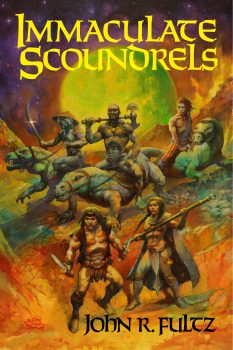Immaculate Scoundrels by John R. Fultz
from Immaculate Scoundrels
I keep revisiting the earliest days of writing about contemporary swords & sorcery lately. Last month I read and reviewed Rogue Blade’s fantastic new anthology, Neither Beg Nor Yield. Now, I’ve just finished John R. Fultz’s return to bash and thrash of the genre with Immaculate Scoundrels (2024).
Fultz was one of the first authors I encountered back in 2011/2012 when I started blogging about S&S. He was one of the writers I discovered through the electronic pages of Black Gate, along with James Enge, Howard Andrew Jones, and Ted Rypel in particular.
Between his collection The Revelations of Zang (2013 – I read it after winning a free copy in a giveaway here at Blackgate!) and The Books of the Shaper series, Fultz staked out a claim to being one of the best new voices in S&S. These works were heavily inspired by Clark Ashton Smith’ and Lord Dunsany’s strange and often psychedelic fiction ladled over with more blood and thunder. If you think I’m maligning him, rest assured I am not. Anybody daring enough to take Smith as an inspiration and make it more violent, well, that’s not a bad thing.
Instead of more S&S, Fultz followed up with a Native American-themed sword & planet duology. I reviewed both The Testament of Tall Eagle (2015) and Son of Tall Eagle (2017) here. I might have been a little disappointed he hadn’t written more stories like his previous ones, but these are good books and Fultz isn’t one to sit around spinning the same tales again and again.
In the intervening years, he’s written enough short fiction to fill two collections. The first, World Beyond Worlds (2021) brings together his fantasy stories from the period. The second, Darker Than Weird (2023) contains fourteen straight-up horror stories. Now, with Immaculate Scoundrels, it’s back to swords & sorcery, but not like in any of his previous books.
Immaculate Scoundrels is a forgotten treasure and the crew an escaped convict puts together to find it. It’s set in a world inspired by Ancient China. From the imperial city of Yhorom, the Celestial Empress rules through cunning and sorcery. Around her, always scheming against each other, are two ranks of wizards: the almost godlike Old Masters and the lesser Young Masters. Under them are the great mass of imperial citizens. Beneath even them are the Montari, the scaleborn.
The scaleborn appear mostly human, but all, to varying degrees, have scales somewhere on their bodies. The only official ways for scaleborn to gain any sort of status in the empire is by serving in the Scaleborn Legions. Some make their own way, surreptitiously, hiding their scales. Some even practice sorcery. It is from their ranks that the book’s heroes are drawn and for whom the book is named.
Breaking out of prison was easy.
Getting out of the city alive would be a miracle.

That’s how you start a story. And that’s how Fultz does it in Immaculate Scoundrels. If those lines don’t grab you, well, I don’t know what to say. Right away we’re introduced to Thold, a scaleborn rogue and thief. He’s been held prisoner in a dungeon below the streets of Yhorom, the capital of a 5,000-year-old empire, for so long, that his beard’s grown down to his waist. When revelries lead to the prison guards’ complacency, Thold escapes. He heads straight for the House of the Yellow Cat, a brothel run by an old flame, Karisha.
Driven mad by the sorcerers he ran afoul of, Thold was recently visited in his dreams by a mysterious goddess. She restored his reason and directed him to find a great treasure in the ancient ruins of Asha-Khana. Asha-Khana was destroyed centuries ago and lies in the middle of a desert peopled by savage — some of them even cannibalistic — tribes. His ex-lover doesn’t fully believe him, but just enough to provide him with mounts and a companion, the axe-wielding fighter, Shan To. Shan To, by the way, promises to kill Thold at the end of their journey for killing his brother.
Between visiting Karisha and leaving Yhorom, Thold acquires a traveling companion, Yett. Yett is a young orphan trained as a deadly martial artist, a Tiger Dancer. He left the brotherhood and has made his way in the mean streets of the imperial city as a beggar and a thief. When the young beggar sees Thold fight, he recognizes him for someone raised to be a Tiger Dancer, too. Impressed and intrigued, he latches on to Thold for whatever adventure might come.
To secure the supplies he’ll need to make the trek to Asha-Khana, Thold needs money. In Kunjao, the City of the Nine Wells, Thold knows a man with the right connections for making a quick score.
As Thold and his companions head out into the empire’s distant provinces, Yuhai, a scaleborn sorceress, has been dispatched on a secret mission by the Celestial Empress. Equipped with powerful talismans by her mistress, Yuhai has been tasked with collecting other scaleborn spellcasters.
The witch hissed as her forked tongue whipped in and out between her pink lips. “I will not go with you to be tortured and executed,” she said. “Your human queen will never steal the secrets of my magic. I will kill you first. I will call lightning from the sky and burn you to ash. Ask the villagers…they have seen me do this…”
“Please,” said Yuhai. “You have no choice in this matter.
You ingested a potion provided to me by the Empress herself, and that means you are coming with me.”
The witch clutched at her scaly throat. “You drugged the wine…” She stood up and pulled a stone knife from her boot.
“Not at all,” Yuhai said.
The witch fell backward on the carpet of furs that lined her cave. She trembled and blinked and sparkled with enchanted colors.
“I put it in the bread.”
Yuhai watched the transformation with curious eyes. The magic of the Empress was always fascinating to witness. The witch’s body shrank inward like a dying flame. The light faded, and now a red-brown sparrow sat nervously on the carpet of furs, twittering a hopeful song. Yuhai watched it until the singing stopped. The bird flapped its wings a few times before hopping onto her outstretched finger. Yuhai sang a spell of changing and the empty wicker basket became a cylindrical birdcage. She opened its door and urged the tiny bird into the cage. Once inside, it found a central perch and began chirping again.
After imprisoning two more sorcerers like the first, she senses a powerful one can be found in the Kunjao.
The final scoundrel is Captain Niro Vont, veteran officer in the Scaleborn Legions. When he is ordered by his commanding Old Master to wipe out a barbarian village, he has the misfortune to run into the village’s witch. For his sins, she sends a demon to possess him.
Niro checked his belt. His sword was there. He drew it with a trembling hand as he struggled to accept what could not be denied. It was his sword, his hand, that had killed these men. Their blood dried on the keen blade even now. Niro understood, and he moaned at the empty sky. The witch had cursed him.
Shakugara the demon-god had used his body as a tool of vengeance.
“…you belong to him now…”
No matter how hard Niro tries to kill himself, the barbarian demon won’t let him die. Instead, for some unknown reason, it forces him to travel toward the city of Kunjao, killing dozens of people along the way.
How are these three sets of characters brought together? You know it’s going to happen. It’s advertised on the very awesome, very old-school S&S cover by Brian LeBlanc. Well, read the book. Seriously, as Immaculate Scoundrels jumped from I kept wondering how Fultz was going to bring them together. I won’t tell you how, but it’s done deftly and with much violence and bloodshed, and more than a little bit of betrayal.
The book takes a different turn after the events in Kunjao, becoming a more straightforward adventure story. There are bandits, and monsters, and even those aforementioned cannibals. After that, things take a turn for the epic. And then, Fultz hits you with a handful of awesome surprises, one on the very last page of the book.
So, I like Immaculate Scoundrels. First, I’m a sucker for heist novels. Secondly, Fultz writes with an affinity and just plain old joy for the genre that is infectious. There are bits and pieces that I’ve encountered before in other stories, but they never feel tired or lazy. Fultz takes this stuff seriously, not in a po-faced way, but the way it needs to be taken to make you not want to put the book down at night but read just one more chapter before turning out the light. Thirdly, they don’t ride horses in the empire, they ride big lizards. By which I mean, Fultz knows cool and brings it to bear in every chapter. And if you don’t think big lizards are cooler than some plain old horses, well, you don’t know cool.
Since I stopped my weekly reviews at Black Gate, I haven’t read much S&S. The truth is, I burned out on the stuff. Oh, I still liked it, but I couldn’t read it. Almost every time I tried to start something that caught my eye I couldn’t finish it. Now, maybe it’s just that enough time’s passed that I’ve recovered, but I’d like to think it’s because the Rogue Blades book and Immaculate Scoundrels were so thoroughly enjoyable they’ve reignited my taste for the stuff, and that’s making me very happy.
Oh, and as this is the first book in a new series, let me tell you, the second book, Times Never Change, is scheduled for a May release.
Fletcher Vredenburgh writes a column the first Friday of the month at Black Gate, mostly about older books he hasn’t read before. He also posts at his own site, Stuff I Like when his muse hits him.
